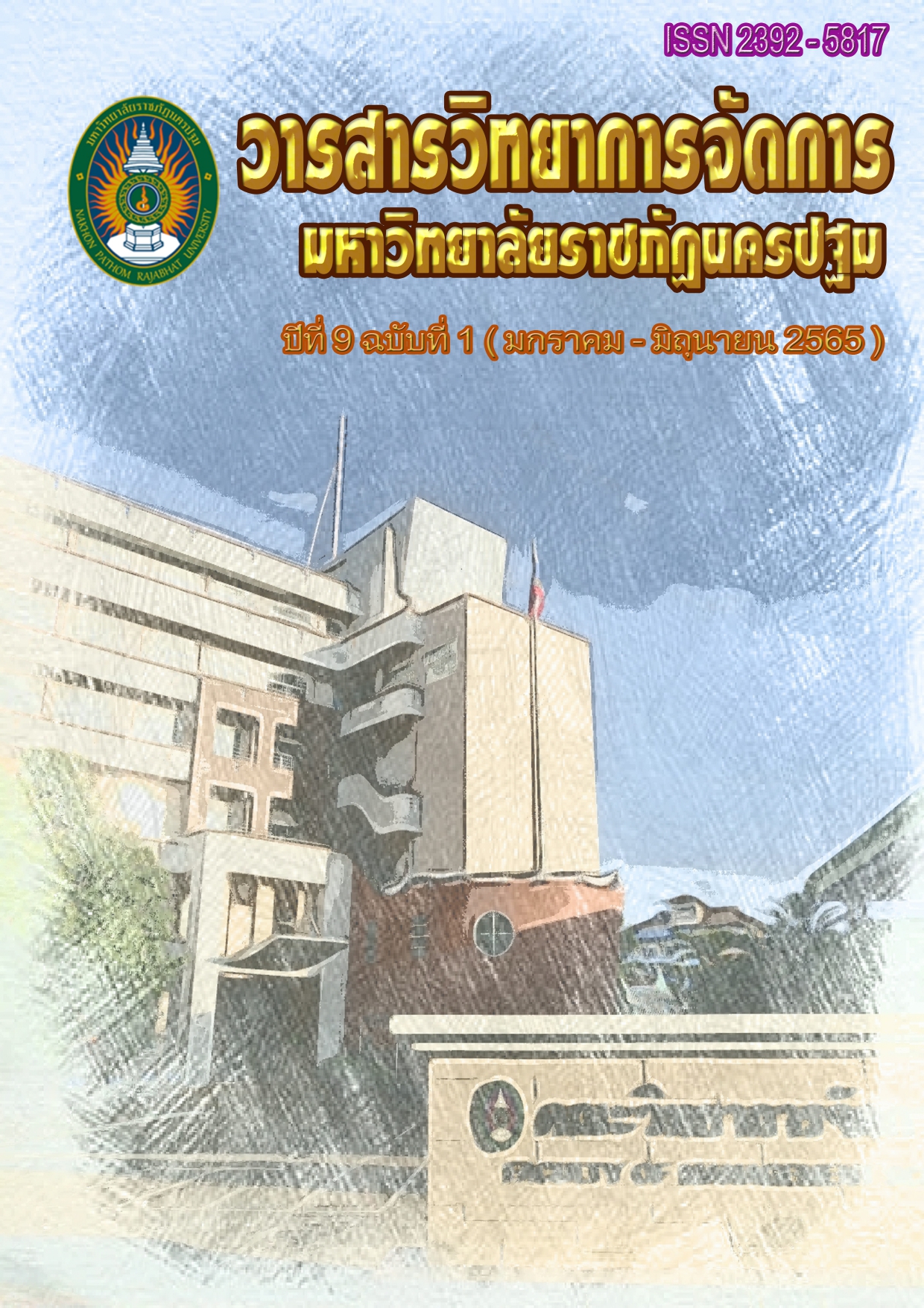แนวทางการจัดการท่องเที่ยวเชิงนิเวศโดยกระบวนการมีส่วนร่วมของชุมชน ในพื้นที่ตำบลระเริง จังหวัดนครราชสีมา
Main Article Content
บทคัดย่อ
การวิจัยครั้งนี้มีวัตถุประสงค์เพื่อ 1) แนวทางสร้างโปรแกรมการท่องเที่ยวเชิงนิเวศ 2) แนวทางการจัดการท่องเที่ยวโดยกระบวนการมีส่วนร่วมของชุมชนตำบลระเริง จังหวัดนครราชสีมา ผู้ให้ข้อมูลหลักในการวิจัย ได้แก่ ผู้มีส่วนเกี่ยวข้องในการบริหารจัดการการท่องเที่ยวโดยสุ่มแบบเจาะจง ประกอบด้วย ผู้ประกอบการท่องเที่ยว จำนวน 2 คน ผู้ประกอบการโฮมสเตย์ จำนวน 5 คน องค์การบริหารส่วนตำบล จำนวน 5 คน ปราชญ์ชาวบ้าน จำนวน 14 คน ผู้นำท้องถิ่น กลุ่มแม่บ้านและกลุ่มสตรี จำนวน 20 คน กำนัน ผู้ใหญ่บ้าน ผู้ช่วยผู้ใหญ่บ้าน จำนวน 29 คน และนักท่องเที่ยว จำนวน 46 คน รวมจำนวน 121 คน ใช้วิธีการเก็บรวบรวมข้อมูลเชิงคุณภาพใช้วิธีการตรวจสอบแบบสามเส้า (Triangulation Method) ด้านแหล่งที่มาของข้อมูลในด้านเวลาสถานที่ท่องเที่ยวแต่ละแห่ง และบุคคลที่เกี่ยวข้องในพื้นที่ จากเทคนิคการเก็บข้อมูล ได้แก่ การสัมภาษณ์ ซึ่งมีแนวข้อคำถามประเด็นในการสัมภาษณ์ การสนทนากลุ่ม การประชุมระดมความคิดเห็น แล้วนำผลมาวิเคราะห์เนื้อหา
ผลการศึกษาพบว่า แนวทางสร้างโปรแกรมการท่องเที่ยวเชิงนิเวศโดยกระบวนการมีส่วนร่วมของชุมชนในพื้นที่ตำบลระเริงจะต้องสอดคล้องกับวิถีชีวิตการจัดการร่วมกันของชุมชน เน้นการอนุรักษ์ทรัพยากรสิ่งแวดล้อมในการจัดการร่วมกันให้อยู่คู่กับชุมชน เช่น ทุ่งหญ้าร่าเริง น้ำตกคลองดินดำ น้ำตกคลองกุ่ม กิจกรรมส่องนกและสัตว์หายากท้องถิ่น เก็บเห็ดป่า ปั่นจักรยานชื่นชมธรรมชาติ กับการเรียนรู้วิถีชีวิตของชาวบ้าน เช่น การทำถนอมอาหาร ขนม ของใช้ สวนเกษตรต่าง ๆ พักโฮมสเตย์ชุมชน ระยะเวลา 2 วัน 1 คืน และการจัดการท่องเที่ยวเชิงนิเวศโดยได้จัดตั้งทีมงานผู้รับผิดชอบการพัฒนาแผนงานการท่องเที่ยว ประชาสัมพันธ์ กำหนดโครงสร้างการบริหารและบทบาทหน้าที่ของกรรมการต่าง ๆ เพื่อขับเคลื่อนการท่องเที่ยวโดยชุมชนในการวางแนวทางการจัดการท่องเที่ยวแบบมีส่วนร่วม ประชาสัมพันธ์ให้คนในชุมชนมีส่วนร่วม จัดตั้งชมรม กรรมการรับผิดชอบแผนงานการท่องเที่ยว ประชาสัมพันธ์การท่องเที่ยวชุมชนต่อนักท่องเที่ยว และพัฒนาสินค้าผลิตภัณฑ์ชุมชนอย่างต่อเนื่อง
* ดร. คณะวิทยาศาสตร์และศิลปศาสตร์ มหาวิทยาลัยเทคโนโลยีราชมงคลอีสาน 30000
2ผู้ช่วยศาสตราจารย์กรัยสรญ์ ขันทจร คณะวิทยาศาสตร์และศิลปศาสตร์ มหาวิทยาลัยเทคโนโลยีราชมงคลอีสาน 30000
3ดร.ธนาวัฒน์ ปัทมฤทธิกุล คณะวิทยาศาสตร์และศิลปศาสตร์ มหาวิทยาลัยเทคโนโลยีราชมงคลอีสาน 30000
4อชิรญา พรมลัง อาจารย์ประจำ คณะวิทยาศาสตร์และศิลปศาสตร์ มหาวิทยาลัยเทคโนโลยีราชมงคลอีสาน 30000
5วรวุธ ลีลานภาศักดิ์ นักวิจัยอิสระ
Corresponding Author E-mail Address: s.kantajorn@hotmail.com
Article Details

อนุญาตภายใต้เงื่อนไข Creative Commons Attribution-NonCommercial-NoDerivatives 4.0 International License.
ทัศนะและข้อคิดเห็นของบทความที่ปรากฏในวารสารฉบับนี้เป็นของผู้เขียนแต่ละท่าน ไม่ถือว่าเป็นทัศนะและความรับผิดชอบของกองบรรณาธิการ
เอกสารอ้างอิง
การท่องเที่ยวแห่งประเทศไทย. (2560). ท่องเที่ยวไทย 2560-2561. [ออนไลน์]. สืบค้นเมื่อ 3 เมษายน 2564 จาก http://thai.tourismthailand.org/about-tat
กรมการท่องเที่ยว กระทรวงการท่องเที่ยวและกีฬา. (2560). คู่มือการตรวจประเมินมาตรฐานคุณภาพแหล่งท่องเที่ยว. (พิมพ์ครั้งที่ 2). กรุงเทพฯ : สำนักงานกิจการโรงพิมพ์องค์การสงเคราะห์ทหารผ่านศึกในพระบรมราชูปถัมภ์.
กลุ่มงานยุทธศาสตร์และข้อมูลเพื่อการพัฒนาจังหวัด สำนักงานจังหวัดนครราชสีมา. (2562). แผนพัฒนาจังหวัดนครราชสีมา พ.ศ. 2561-2565 ฉบับทบทวน ปีงบประมาณ พ.ศ.2564. นครราชสีมา : สำนักงานจังหวัดนครราชสีมา.
ทัศณีย์ บุญทิพย์. (2563). การจัดการท่องเที่ยวเชิงนิเวศโดยชุมชน ตำบลท่าขนอน อำเภอคีรีรัฐนิคม จังหวัดสุราษฎร์ธานี. วารสารวิชาการสังคมมนุษย์ มหาวิทยาลัยราชภัฏนครศรีธรรมราช. 10 (2), 81-93.
เบญจวรรณ สุจริต และ ชัชชัย สุจริต. (2560). รูปแบบการจัดการท่องเที่ยวโดยชุมชนของตำบลนางพญา อำเภอท่าปลา จังหวัดอุตรดิตถ์. วารสารวิชามหาวิทยาลัยราชภัฏอุตรดิตถ์. 12 (2), 53-65.
วารยาภา มิ่งศิริธรรม และ รวีวรรณ โปรยรุ่งโรจน์. (2564). รูปแบบการจัดการท่องเที่ยวโดยชุมชนอย่างยั่งยืน: กรณีศึกษาชุมชนคลองมหาสวัสดิ์ อำเภอพุทธมณฑล จังหวัดนครปฐม. วารสารการวิจัยการบริหารการพัฒนา. 11 (1), 38-49.
วรรณวิมล ภู่นาค. (2558). ศักยภาพชุมชนในการจัดการท่องเที่ยวโดยชุมชน: กรณีศึกษาตลาดน้ำอัมพวา. วารสารวิทยบริการ มหาวิทยาลัยสงขลานครินทร์. 26 (1), 63-74.
ศิรินันท์ พงษ์นิรันดร โอชัญญา บัวธรรม และชัชชญา ยอดสุวรรณ. (2559). แนวทางในการพัฒนาศักยภาพการจัดการท่องเที่ยวอำเภอวังน้ำเขียว จังหวัดนครราชสีมา. วารสารวิทยาลัยบัณฑิตศึกษาการจัดการ มหาวิทยาลัยขอนแก่น. 9 (1), 234-259.
สุขุม คงดิษฐ์ ธารนี นวัสนธี วรรษา พรหมศิลป์ ศุภฤกษ์ กลั่นกล้า และ ณัฐพล รื่นถวิล. (2561). โครงการนวัตกรรมการเชื่อมโยงการตลาดการท่องเที่ยวนิเวศเกษตรชุมชนสามเรือน อำเภอบางปะอิน จังหวัดพระนครศรีอยุธยา. พระนครศรีอยุธยา: มหาวิทยาลัยเทคโนโลยีราชมงคลสุวรรณภูมิ.
สุถี เสริฐศรี. (2558). แนวทางการจัดการท่องเที่ยวอย่างยั่งยืนในชุมชนคลองโคน อำเภอเมือง จังหวัดสมุทรสงคราม. วิทยานิพนธ์หลักสูตรศิลปศาสตรมหาบัณฑิต การจัดการอุตสาหกรรมการบริการและการท่องเที่ยว. มหาวิทยาลัยกรุงเทพ.
สำนักงานปลัดกระทรวงมหาดไทย. (2551). การบริหารและการจัดการท่องเที่ยว. กรุงเทพฯ: กระทรวงมหาดไทย.
องค์การบริหารส่วนตำบลระเริง. (2564). ประวัติความเป็นมา. [ออนไลน์]. สืบค้นเมื่อ 3 เมษายน 2564 จาก http://raroeng.go.th/data_426.
อริสา สำรอง และ สุภัทริภา ขันทจร. (2562). ปัจจัยที่ส่งผลต่อการเป็นองค์การสู่ความเป็นเลิศของชุมชนท่องเที่ยวนวัตวิถีในประเทศไทยตามแนวประชารัฐ: กรณีศึกษาชุมชนท่องเที่ยวนวัตวิถี อำเภอปากช่อง จังหวัดนครราชสีมา. วารสารสหวิทยาการวิจัย: ฉบับบัณฑิตศึกษา. 8 (2), 74-84.
Adhikary, M. (1995). Management of Ecotourism. Bangkok: Srinakarinwirot University.
Choibamroong, T. (2014). Agricultural Resources Research for Sustainable Agro-tourism: A Case Study of Surat Thani, Thailand. NIDA Development Journal. 54 (3), 202-220.
Donohue, H. & Needham, R. (2006). Ecotourism: the evolving contemporary definition. Journal of Ecotourism. 5 (3), 192-210.
Fennell, D. A. (2020). Ecotourism. (5th ed). New York: Routledge.
Honey, M. (2008). Ecotourism and sustainable development: Who owns paradise? (2nd ed.). Washington, DC: Island Press.
Kontogeorgopoulos, N., Churyen, A., & Duangsaeng, V. (2015). Homestay Tourism and the Commercialization of the Rural Home in Thailand. Asia Pacific Journal of Tourism Research. 20 (1), 29–50.
Mgonja, J.T., Sirima, A. & Mkumbo, P. J. (2015). A review of ecotourism in Tanzania: magnitude, challenges, and prospects for sustainability. Journal of Ecotourism. 14 (2-3), 264-277.
Niesenbaum, R. A. & Gorka, B. (2001). Community-Based Eco-Education: Sound Ecology and Effective Education.The Journal of Environment Education. 33 (1), 12-16.
Othatawong, A. (2014). Community Participation in Talay Bua Dang Conservation within Chiang Wae Municipal Area, Kumphawapi District, Udonthani Province. Academic Services Journal Prince of Songkla University. 25 (1), 47-53.
Reimer (Kila), J. K., & Walter, P. (2013). How do you know it when you see it? Community-based ecotourism in the Cardamom Mountains of southwestern Cambodia. Tourism Management. 34, 122-132.
Scheyvens, R. (2007). Ecotourism and gender issues. In James Higham (Ed.), Critical issues In ecotourism. Oxford: Butterworth-Heinemann.
Stronza, A., & Gordillo, J. (2008). Community views of ecotourism. Annals of Tourism Research. 35 (2), 448–468.
The International Ecotourism Society. (2021). What is ecotourism? Retrieved April 3, 2021, from http://www.ecotourism.org.
The United Nations World Tourism Organization. (2014). Tourism Highlight 2014 Edition. Retrieved April 3, 2021, from https://www.e-wto.org.
Tran, L., & Water, P. (2014). Ecotourism, gender and development in northern Vietnam. Annals of Tourism Research. 44, 116-130.
Walker, K. & Moscardo, G. (2014). Encouraging sustainability beyond the tourist experience: Ecotourism, interpretation and values. Journal Sustainable Tourism. 22 (8), 1175-1196.
Weaver, D. B. & Lawton, I., J. (2007). Progress in tourism management. Twenty years on: the state of contemporary ecotourism research. Tourism Management. 28, 1168-1179.

